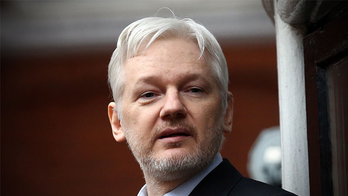As if the threat of a nuclear Iran and the challenge of rising violence in Afghanistan weren't cause enough for concern, Barack Obama's incoming administration was dealt the news Thursday that Hamas doesn't intend to renew its expiring cease-fire with Israel.
The end of the six-month cease-fire, coming only a month before President-elect Obama takes office, could complicate his administration's efforts in the peace process between the Israelis and the Palestinians.
The cease-fire, which has been broken sporadically, was negotiated with the help of the Egyptians. It was set to expire Friday, but escalating violence along the border in recent weeks -- including a barrage of rocket attacks from the Gaza Strip over the past few days -- signaled the agreement likely would not be extended.
"The calm is over," Hamas official Ayman Taha declared Thursday, according to Israeli media. He accused Israel, which has launched air strikes against rocket-launching sites, of violating the agreement.
Tamara Wittes, senior fellow at Brookings' Saban Center for Middle East Policy, said she suspects both sides still are interested in a new cease-fire, but if violence is allowed to spiral in the interim it could torpedo long-term peace talks.
The expiration of the agreement comes at an awkward time for both Israel and the United States. While Obama still is naming his Cabinet members in the run-up to his inauguration on Jan. 20, Israel is preparing for elections in February.
Wittes said the United States probably would continue to rely on a third party like Egypt to act as an intermediary between Israel and Hamas, but the U.S. needs to continue diplomatic meetings in the coming weeks with Israelis and Palestinians. That would give both parties incentive, by keeping the "political horizon" of a long-term peace visible.
"In that vacuum, violence will take over," she said. "What the United States needs to do is fill that space with other types of diplomatic activity. ... We have to show some presence."
Secretary of State Condoleezza Rice was having dinner Thursday night with Palestinian President Mahmoud Abbas, whose Fatah group lost control of the Gaza Strip to Hamas in 2007.
State Department spokesman Sean McCormack told reporters Rice views the long-term negotiations as a "bottom-up process in the sense of it is the Israelis and the Palestinians who are driving the process. We're there to help. We're there to help shepherd."
In response to the announcement from Hamas, the State Department released a written statement Thursday condemning the latest rocket attacks on Israel and saying the cease-fire should be "respected and extended."
McCormack said the next administration would have to decide how much it will use the peace process discussed at last year's Annapolis summit as a blueprint.
Hillary Clinton, Obama's pick for secretary of state, would be poised to continue her husband's efforts to establish a lasting peace in the region. Obama's transition team would not comment on whether she is being briefed on the matter.
Asked about the apparent dissolution of the cease-fire, Obama's national security spokeswoman Brooke Anderson told FOXNews.com in an e-mail, "There is one president at a time and we intend to respect that."
She referred FOXNews.com to the June speech Obama gave before the American Israeli Public Affairs Committee, in which the president-elect voiced strong support for Israel's interests.
In the speech, he said the U.S. would ensure that Israel can defend itself from any threat, including Gaza, but that he was committed to working toward a two-state solution from the outset of his administration. Obama said Hamas must renounce terrorism before it can come to the negotiating table.
Asked about the priorities of the incoming administration, Jonathan Peled, spokesman for the Israeli Embassy in Washington, told FOXNews.com: "Everything should be done to curb terrorism emanating from Hamas."
Peled said Israel is interested in "peace and quiet, so long as we can ensure no more rockets and missiles are fired out of Gaza."
He said 250 missiles have been fired from Gaza in the past three weeks, and about 24 hit in the last 24 hours. He said Hamas was stating the obvious in declaring an end to the cease-fire.
Peled said Israel responded most recently Wednesday night by striking Gaza sites where rockets are manufactured and stored. But he said, considering the firings out of Gaza, "We've been very, very restrained."
If the cease-fire indeed expires without attempts to renew it, it's unclear whether Israel would launch a more severe military response in Gaza.
Wittes said such a move would be damaging to Israel politically, and damaging to Hamas physically.
In a recent interview with Haaretz Magazine in Israel, the country's Defense Minister Ehud Barak said the peace was not a mistake.
"If the quiet continues, there will be quiet. If the calm breaks, we will operate," he said.
FOX News' Nina Donaghy contributed to this report.




